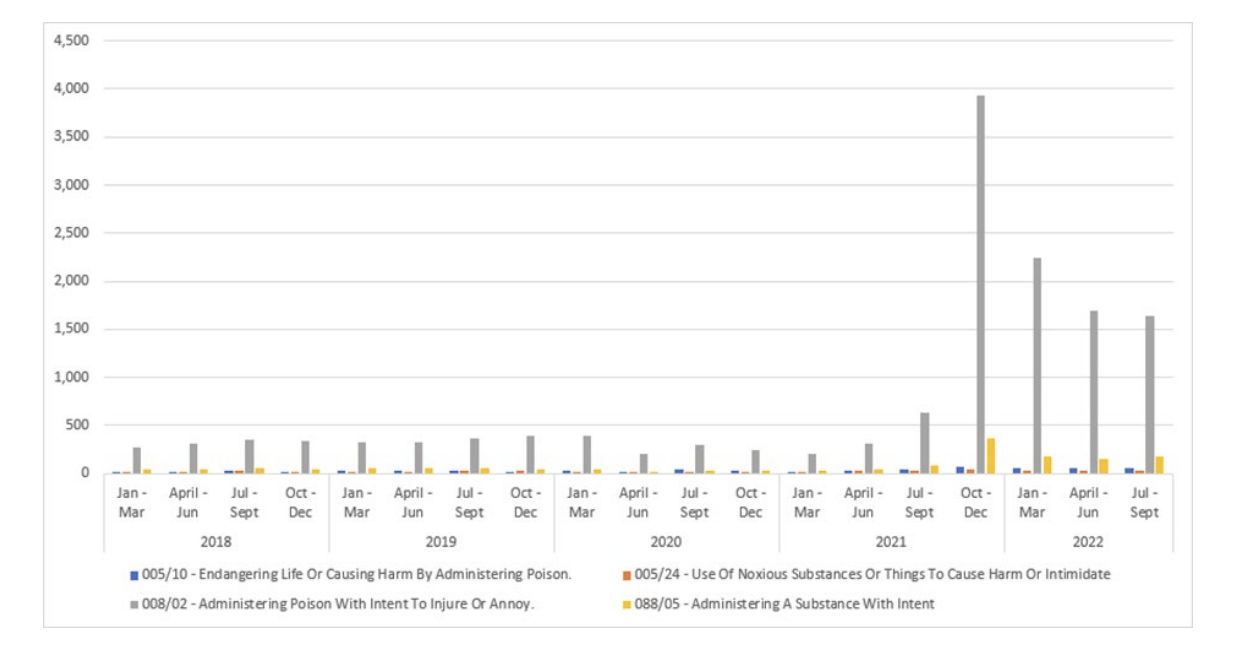The Home Office announces a package of measures on spiking
Jim is an Associate Editor (SUs) at Wonkhe
Tags
At the time a raft of “pop up” student activist groups under the moniker “Girls Night In” organised a boycott of venues – demanding better training and recruitment of security staff, increased body/bag searching, better CCTV at bars, and better care for those who think they’ve been spiked.
Since then we’ve had a Westminster Hall debate (and another in January of this year), the Commons’ Women and Equalities Committee have called for change, the Home Affairs Committee held a dedicated inquiry, Universities UK formed a working group and published some guidance for universities, and the government was even mandated to published a report on prevalence and understanding and tackling spiking via an amendment to the Police, Crime, Sentencing and Courts Act 2022 – although its publication has ended up seven months late.
Now over two years later, the Home Office has finally properly responded with a significant package of measures.

Language
On the legislation issue, the Home Office says it undertook a full and thorough assessment of the legislative framework and concluded that existing law covers a broad range of behaviours and incidents that include and extend beyond spiking, with tough penalties attributed to them.
However, given there is not a single defined offence, and nor were the existing laws drafted with in mind, it’s going to use its current-session Criminal Justice Bill to update the language of existing legislation to make clear that spikling is illegal, and will set out detailed guidance to provide a clear, unequivocal definition of the crime.
It says that will give victims renewed confidence to come forward, increase public awareness of the crime and enforce that perpetrators will face up to 10 years behind bars.
Licence to spike
Much of the Girls Night In focus was on those running clubs and pubs – yet despite Home Office minister Rachel Mclean claiming in 2021 that local authority licensing committees were focussed on violence against women and girls (“we insist on it and require them to do so”), our own research into Statements of Licensing Policy in use in each of the major university towns and cities in England and Wales found that just two made meaningful reference to the crimes of adult sexual harassment or assault or gender-based violence, and the strategies licensees should adopt to reduce or prevent it.
Yet all made multiple specific references to other types of crime, including violence, drug abuse, use of firearms, child sexual exploitation, etc.
So following a brief consultation with the industry back in January (that several students’ unions helpfully gatecrashed when we got wind of it), the Home Office has now updated its statutory guidance under section 182 of the Licensing Act 2003 to require all licensees prevent incidents of spiking.
The new guidance actually also goes further – it will also require local Statements of Licensing Policy to consider the prevalence, prevention and reporting of sexual harassment and misconduct and broader violence against women and girls crimes.
The Local Government Association’s guidance on drink spiking prevention – which includes lots of advice on working closely with folk like universities across a local authority area – will now effectively become statutory.
Other bits and bobs
There’s a bunch of other things happening too.
The Home Office will provide up to £250,000 of funding for a training programme to upskill staff in the night-time economy. That will be aimed at raising awareness, helping to spot the signs of someone who may have been spiked, and for individuals to learn how best to support victims, prevent spiking incidents, and to support police in the collection of evidence.
There will also be investment into research into spiking testing kits to help venues and police detect if someone’s drink has been spiked in real-time, a series of intensive operations run by the National Police Chiefs Council (NPCC) to tackle spiking during key weeks across the 43 police forces in England and Wales, and an online spiking tool will be rolled out to all police forces to make it easier to anonymously report it if people fear they have been a victim of the crime.
There will also be a spiking guidance/advice toolkit for the public that contains a range of resources and signposting for anyone who is looking for information on spiking, what it is, who is affected, how to report it, how to support victims, and which criminal offences can be used to prosecute it.
Oh – and there’s a vague read across to both the Office for Students’ forthcoming consultation response on harassment and sexual misconduct, and a reference to the Department for Education’s work on prevention aimed at men/boys – which my colleague Sunday Blake evaluated here.
Do we know more?
On the prevalence and causes issues, the statutory report is pretty thin – it’s essentially a lit review that effectively says the jury’s out on true prevalence given underreporting and the lack of capacity/speed in testing when it is reported. We’re not really any further on in understanding the issue from when Sunday weighed the evidence back in January 2022.
Meanwhile not everyone will welcome measures aimed at enhancing the securitisation of venues – plenty of students of colour warn that increased security to tackle incidents of spiking are misguided, ineffective, and could have serious repercussions on some students. And plenty of experts worry that the biggest reason for low spiking convictions is that police don’t know enough about spiking and aren’t properly trained – and don’t have the resources or inclination to take it forward.
Nevertheless, for the GNI and SU campaigners that were lobbying hard on this, the licensing changes and the investments for England and Wales are a win – and the revised language in law should help too.

